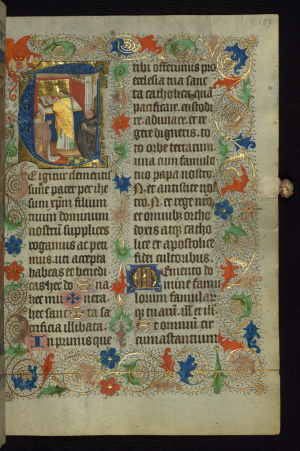
 HEN WRITING THIS POST, the first thing that came to mind was, “I need expound on the idea of singing the orations at Mass as a springboard to the singing congregation,” as I mentioned in one of my first posts here. I then realized that in that post, I never mentioned singing the orations at all. How neglectful of me!
HEN WRITING THIS POST, the first thing that came to mind was, “I need expound on the idea of singing the orations at Mass as a springboard to the singing congregation,” as I mentioned in one of my first posts here. I then realized that in that post, I never mentioned singing the orations at all. How neglectful of me!
The starting point for all music in liturgy must be in the prayers of the Mass itself. Musicam Sacram mentions these sung prayers in the first degree of importance when singing the Mass:
29. The following belong to the first degree:
(a) In the entrance rites: the greeting of the priest together with the reply of the people; the prayer.
(b) In the Liturgy of the Word: the acclamations at the Gospel.
(c) In the Eucharistic Liturgy: the prayer over the offerings; the preface with its dialogue and the Sanctus; the final doxology of the Canon, the Lord’s prayer with its introduction and embolism; the Pax Domini; the prayer after the Communion; the formulas of dismissal.
Furthermore, it is my experience that when the priest begins the Mass, singing the sign of the cross and greeting with its response for the congregation, he sets the tone for the entire Mass, in both music and solemnity. These orations and responses are simple but effective ways to enhance liturgical reverence. They are so simple that they belie the perennial excuse of “I can’t sing.”
Like almost all things liturgical, the priest, specifically the pastor, must be on board before progress in music can be sustained, if it can be made at all. I have noticed that many music directors can improve the quality of liturgical music in their parishes, but without the support of the pastor, such endeavors have a definite ceiling and can be easily reversed. Therefore, good musical formation of the priests in our dioceses is critical.
I am blessed to be in an Archdiocese where most of the priests have been formed, one way or another, by Saint Meinrad Archabbey. The musical heritage of that abbey (Benedictines. Surprised, anyone?) has been a blessing to the Archdiocese for years. Furthermore, this year we will be beginning an Archdiocesan “Seminarian Schola” to sing for special Masses. It is my hope that the exposure to the heritage of Catholic liturgical music will be a boon to their liturgical formation.
In order for the musical improvement of the liturgy to get off the ground, we need the cooperation of pastors. Singing the prayers of the Mass is a simple way to get started in the right direction, and will give the rest of the parish a launching point from which to solemnize their prayer.
As always, please support and pray for our priests and seminarians.

